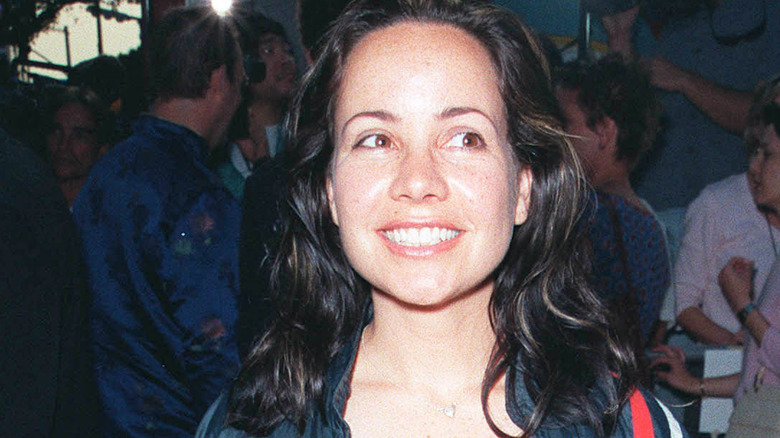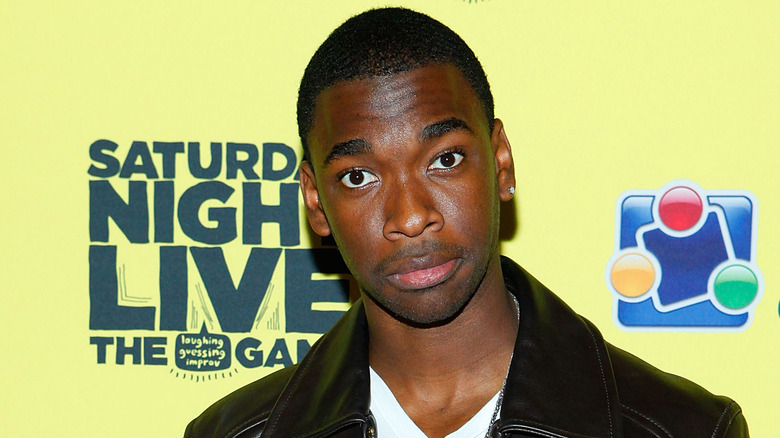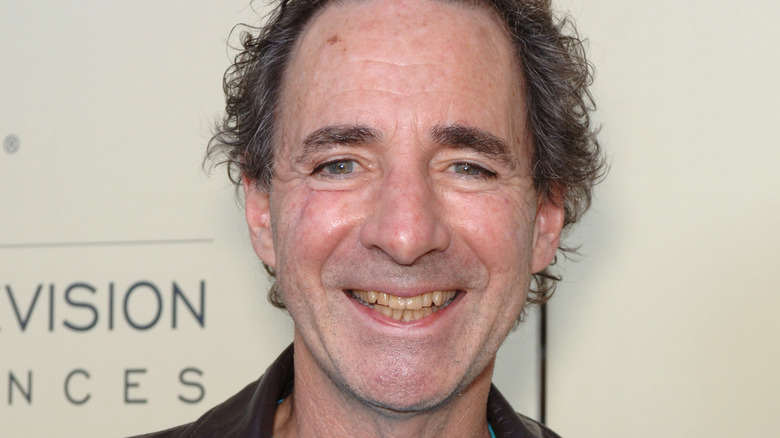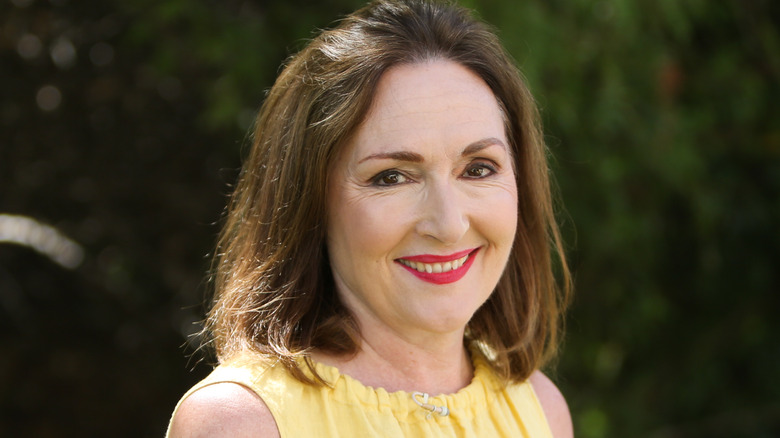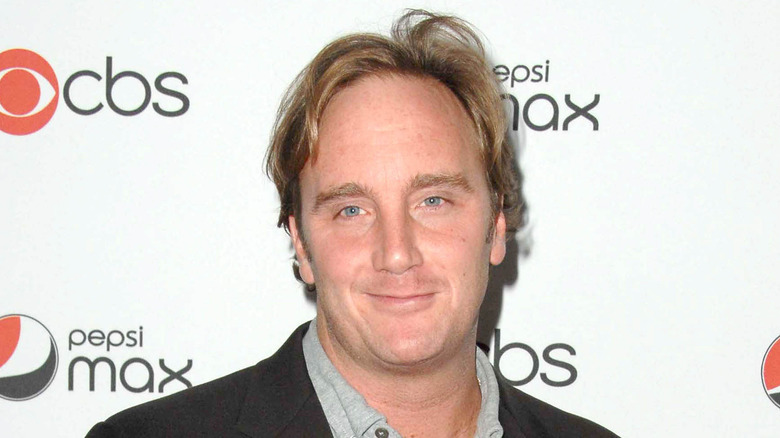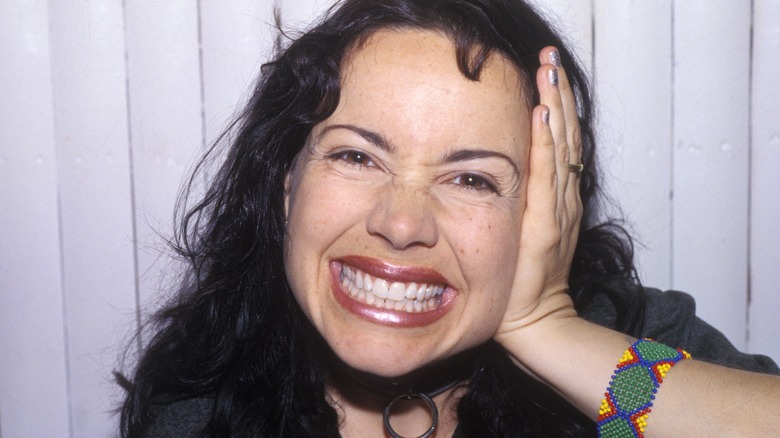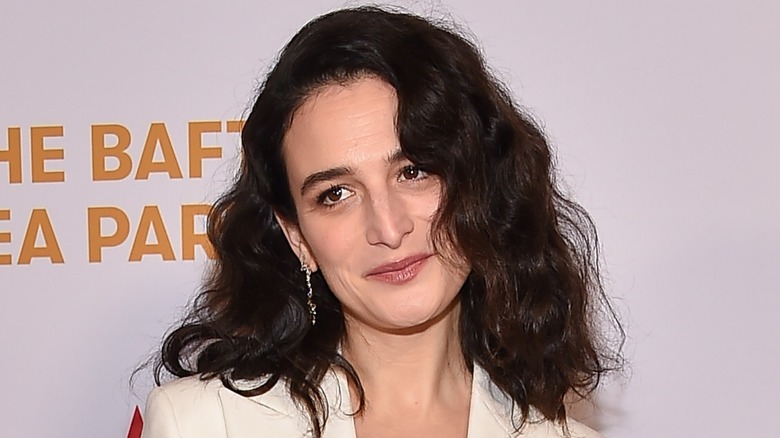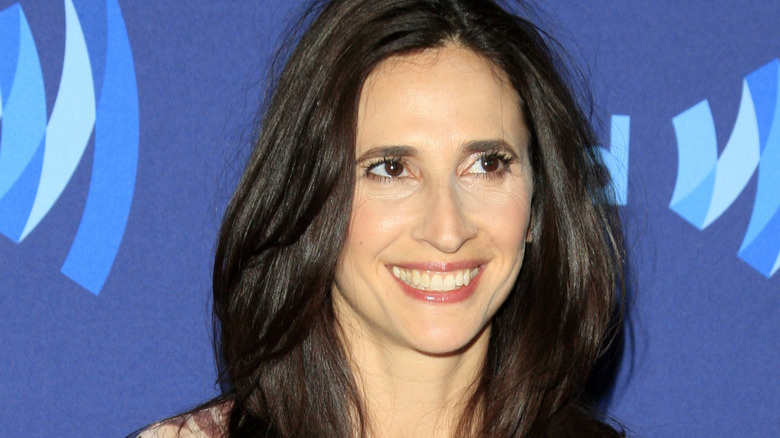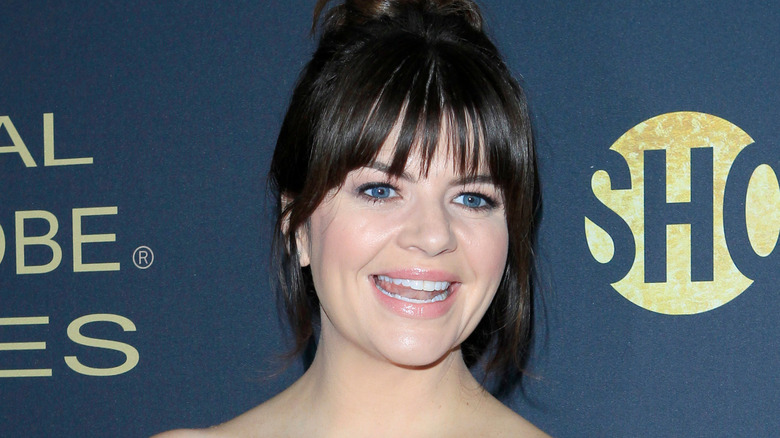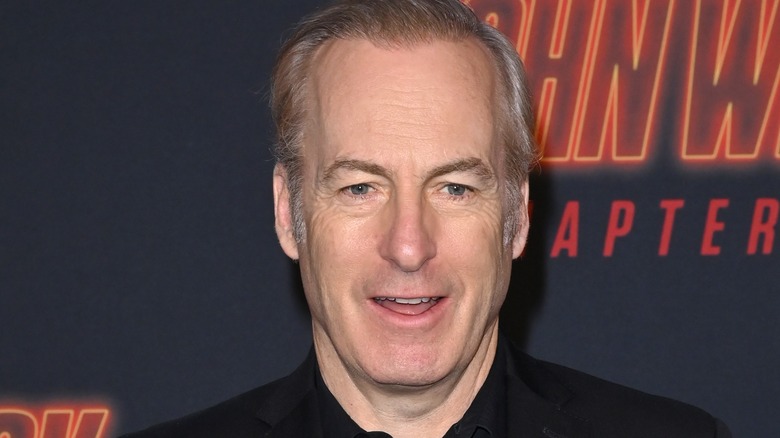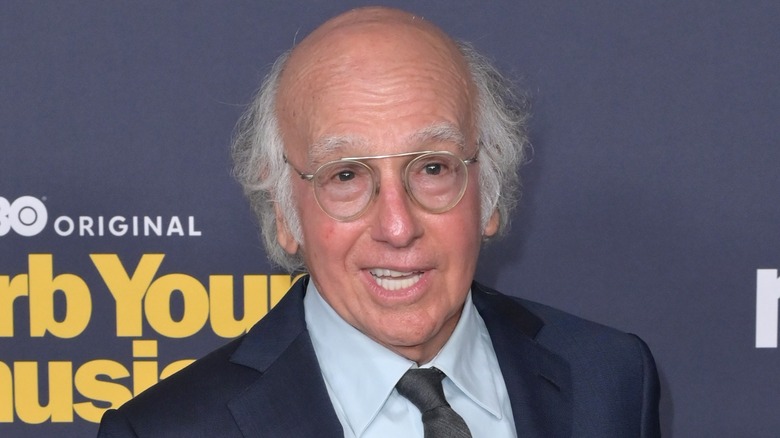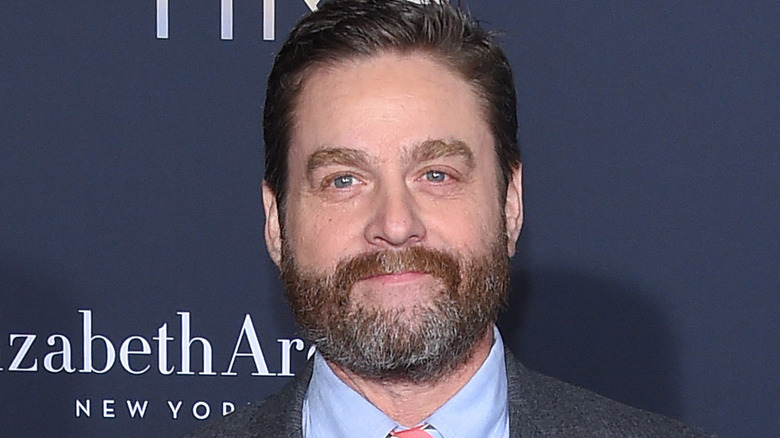SNL Stars Who Hated Being On The Show
Probably the most venerable comedy show in American TV history, "Saturday Night Live" has been shaping humor and making headlines since its debut on NBC's late-night schedule in 1975. "Saturday Night Live," which only exists thanks to Johnny Carson, has served as a launchpad to success for dozens of the biggest TV and movie stars, like Adam Sandler, Bill Murray, Tina Fey, and Eddie Murphy. But making it onto the show is an achievement unto itself for young and rising actors and comedians, as the show's mishmash of political, satirical, and absurd humor sketches provides a high-profile vehicle for their skills.
And yet many of the people who were triumphantly selected to be a main cast member, featured player, or staff writer on "Saturday Night Live" were completely let down by the show. It's a true but weird fact about "Saturday Night Live" that some participants' experience on the show did not meet their lofty expectations or even pass muster as neither a decent place to work nor hone their craft. Here are the "SNL" cast members who have spoken out about how they didn't enjoy their time making sketch comedy on the biggest stage possible.
Jay Pharoah
During the presidency of Barack Obama, "Saturday Night Live" needed an actor to portray him on a regular basis, and so the show brought in Jay Pharoah in 2010. A stand-up comedian and mimic, he enlivened "SNL" with sketches built around his uncanny impersonations of Kanye West, Ben Carson, Katt Williams, Jay-Z, Will Smith, and Denzel Washington. A major star of the "SNL" cast for six years, NBC announced Pharoah's abrupt exit from the series in the summer of 2016, implying that he departed of his own volition to seek bigger and better jobs in entertainment.
Half a year later, Pharoah clarified that "SNL" had fired him, following a prolonged period of the actor feeling like his skills weren't used as often as he would've liked. "If you have multiple people on the cast saying things like 'you're so talented, you're so able, they don't use you and it's unfair and it's making us feel bad,'" he told "Ebro in the Morning," adding that he believed he came across as a difficult collaborator. "They put people into boxes. Whatever they want you to do, they expect you to do. I'm a little fiery, too."
Harry Shearer
Harry Shearer has been an integral part of several comedy institutions. In addition to voicing characters on "The Simpsons," playing with the spoof metal band Spinal Tap, one of the best fictional rock bands of all time, and serving in Christopher Guest's mockumentary actor squad, he was a cast member on "Saturday Night Live." He's one of the few people to perform on the show in two separate runs. Four years into the run of "SNL" in 1979, Shearer was selected to be one of the first actors to replace an original cast member, filling the void left by the exits of John Belushi and Dan Aykroyd. "Living hell," is how Shearer described to IGN what it felt like to work on "SNL" at the time. "The way it was organized, the way people were treated, the approach to the material," according to Shearer were all abysmal, and he blamed the show's bosses for that toxic environment. "It was about as far from pleasant as you can possibly get. It was extremely challenging."
Shearer bolted after the 1979-1980, and yet returned in the fall of 1984 for another one-season stint. The main cast of "This Is Spinal Tap" were all offered cast slots, and Shearer and Guest accepted. "I thought things had changed — and found to my dismay that they hadn't," he explained.
Nora Dunn
When "SNL" creator and producer Lorne Michaels returned to the show after a five-year sabbatical to make other TV shows and movies, one of the first new hires he made for the cast was Chicago comedy theater veteran Nora Dunn. She'd never appeared on screen before her 1985 "SNL" debut, but she quickly rose to the challenge, and over the next five seasons became one of the show's most reliable presences, the center of popular recurring sketch pieces like the lounge act the Sweeney Sisters and self-absorbed talk show host Pat Stevens. Dunn's most famous moment at "SNL" came in 1990, when she publicly refused to appear in an episode hosted by stand-up comedian Andrew "Dice" Clay in protest of his boorish humor that Dunn believed to be misogynistic.
That was a rough moment, but there were a lot of those at "Saturday Night Live" for Dunn. "'SNL' is a traumatic experience," she told Salon. "It's kind of something you have to survive and you really have to learn. I made a lot of mistakes."
Jay Mohr
A stand-up comedian who would go on to star in the sitcoms "Action" and "Gary Unmarried," Jay Mohr got added to "Saturday Night Live" as both a writer and featured player in 1993. At the time, "SNL" operated with a cast of 16, one of its biggest ever, and Mohr had a tough time getting himself and his material on the air. He skirted through most of two seasons, contributing little to the final, broadcast versions of the show, culminating in a March 1995 episode in which he hadn't been allocated any lines in any sketches. Mohr had grown so fraught with workplace stress and anxiety, and fearing that he'd lose the job that was supposed to be his big break, he stole a comedian's bit. "I took Rich Shapiro's act and wrote it down word for word and submitted it as my sketch," Mohr admitted in his memoir "Gasping for Airtime" of the piece about an angry bartender he called "O'Callahan and Sons." The sketch made it into the "SNL" episode hosted by Paul Reiser.
Shapiro was a fairly prominent New York comedian at the time, and it didn't take long before Mohr's bosses at "SNL" figured out what he'd done. "O'Callahan and Sons" didn't appear in reruns of the show, and at the end of the 1994-95 season two months later, Mohr was fired.
Janeane Garofalo
A leader of the hip, alternative comedy scene and a breakout star of "Reality Bites," Janeane Garofalo completed a big 1994 by accepting an offer to become a repertory player on "Saturday Night Live." The show was in flux at the time, dealing with a ratings shortfall and seeking a soft reboot by hiring well-known comedians, like Chris Elliott, Michael McKean, and Garofalo. Before any of her episodes even aired, Garofalo publicly expressed her grievances with "SNL." In an interview with "The Observer," (via "New York") she called the 1993-1994 season "unwatchable." Among the few stars who can't stand Adam Sandler, Garofalo thought the show was hindered by her cast mate's "childish" work.
In a feature for "New York" detailing the backstage drama at "SNL," Garofalo said that working at the show, where she was mostly cast in bit roles, was "the most miserable experience of my life," and that she used cigarettes and vodka to cope. "She's absolutely destroyed as a person," a friend said of the comedian after one particularly tough episode in which Garofalo's participation was limited. Garofalo took issue with Sandler and his cronies' insistence on making fun of LGBT people and homosexual acts. "That's considered incredibly funny," she deadpanned. Eventually, she'd had enough, and Garofalo quit "SNL" after 14 episodes.
Jenny Slate
It may often take a few episodes or more for a new "Saturday Night Live" cast member to make a big impact on the show, but Jenny Slate accomplished both of those things in her very first "SNL" appearance, the 2009-2010 season premiere. In a sketch called "Biker Chick Chat," Slate, host Megan Fox, and cast member Kristen Wiig played salty motorcycle enthusiasts who liberally peppered their speech with profanity, except that since this played on network TV, they had to say "frickin'." Then Slate accidentally said the real F-word, noticing her mistake as she visibly sighed and the sketch briefly lost momentum.
Slate wasn't fired from "SNL," at least not right away. She rode out the rest of the season on the show, appearing in sketches from time to time, befitting of a featured player but never enjoying a real breakout moment. When the season completed, Slate didn't get called to return for another year on "SNL," leading to widespread speculation that the F-word uttered months earlier led to her dismissal. "Everyone always thinks I got fired for saying f***: I didn't, that's not why I got fired. I just didn't belong there," she told InStyle. "I didn't do a good job, I didn't click. I have no idea how Lorne [Michaels] felt about me. All I know is, it didn't work for me, and I got fired."
Michaela Watkins
After performing for years with the influential Los Angeles comedy troupe The Groundlings, Michaela Watkins got the call to join "SNL" in 2008, in part to fill the void left by departing superstar Amy Poehler. Joining the show during an election year, Watkins most frequently made appearances as influential journalistic figures of the time, notably Barbara Walters, Ann Coulter, and Arianna Huffington. After spending the 2008-2009 season as a featured player in the cast, Watkins wasn't asked back to "SNL" for a second season, fired along with Casey Wilson.
Despite her background in producing comedy on a tight timeline, both theatrical and in numerous TV sitcom guest spots and recurring roles, Watkins had a hard time getting started at "SNL" but thought she ultimately found a niche. "I feel like it was a marathon, but the week I got there, they cut my Achilles. They're like, OK, start running. I don't feel like I came in into a soft landing at all," Watkins told The Daily Beast in 2020. "I thought we were all having a good time, but then they didn't renew my contract the next year. Maybe I was delusional. I really wanted to go back. I would have been really happy if they'd had me for three seasons."
Casey Wilson
Casey Wilson joined "Saturday Night Live" in January 2008, and over one-and-a-half seasons, she wasn't utilized often. Writers usually cast her in sketches for her vague physical resemblance to celebrities, including Rachael Ray, Elizabeth Taylor, and Christina Hendricks. Many of the characters Wilson was tasked with playing were not thin, and body image issues and criticisms over her weight would haunt the actor's tenure at "SNL."
After successive agents urged her to lose weight, Wilson did so and secured roles in the movie "Julie and Julia" and "SNL" on the same day. "But I'm not sure I would have gotten them if I hadn't lost the weight," she wrote in "The Wreckage of My Presence" (via Vulture). To cope with grief over the death of her mother and negotiating the stress of "SNL" and comments about her body, Wilson overate, regaining the weight she'd lost. She was not asked back to the show for a third season. "I felt a rush of relief and utter disappointment in myself. I had the chance and I didn't take my shot. But I never cried. The relief outweighed the regret," she wrote. Days later, the media reported that Wilson lost her job at "SNL" for weight-related reasons. "That was the night I cried. I wailed. I've never been more humiliated or felt more exposed."
Bob Odenkirk
Acclaimed dramatic actor Bob Odenkirk began his career at "Saturday Night Live." He wrote from 1987 to 1991, and then off and on through 1995 while also occasionally making small on-screen appearances. Odenkirk was just 25 years old when he joined "SNL." "I was unsure of myself. It was hard. It was existentially dangerous," he told the podcast "Don't Ask Tig" (via Deadline). "It's hard for kids to believe you when you say, 'I had no f***ing clue what I was doing and I was scared outta my wits for years."
Odenkirk developed what he believes was a defeating, self-righteous attitude. "I was a very opinionated comedy writer," he told "Couch Surfing" (via Entertainment Weekly). He particularly opposed one of the most controversial "SNL" skits of all time, in which Chris Farley auditioned for a spot in the Chippendales dance troupe opposite host Patrick Swayze. "Writers I knew and respected defended this sketch because it had a funnyish idea buried in it: the Chippendales judges prefer Swayze's dancing over Chris's but can't put a finger on why. But that idea is not what produced the gales of cackling (and gasps) from the live audience. Chris flopping his overstuffed body around did that," Odenkirk wrote in "Comedy Comedy Comedy Drama." (via Entertainment Weekly) "I feel like I can see it on his face in the moment when he rips his shirt off. Shame and laughter are synthesized in the worst way."
Larry David
Following his time on ABC's short-lived sketch show "Fridays," Larry David got hired to write sketches for "Saturday Night Live" in 1984. As the weeks wore on, David grew increasingly frustrated by his seeming inability to get any of his ideas onto the show. "My sketches would do very well at the read-through and then they would invariably get cut," he told "The Howard Stern Show" in 2015. The last straw came when a David sketch was deleted by producer Dick Ebersol five minutes before airtime. An upset David confronted Ebersol. "I marched over to him, I said 'This f***ing show stinks! It stinks! It's s***! I'm done! I'm gone! F** this! I'm out!'" he recalled.
As he walked home, David realized he'd just left a well-paying job and also violated his contract with NBC. David's neighbor advised him to go back to work on Monday and pretend like he'd never quit. The gambit worked — nobody wanted to call out David, and a couple of weeks later, he got his one and only sketch on the air during his single season at "SNL," a bit about an architect who wants to build a stool into an elevator so the operator has someplace to relax. That concept later became the B-plot of a 1995 "Seinfeld" episode, where George (Jason Alexander) gifts a rocking chair to a security guard forced to stand.
Zach Galifiankis
Alt comedian Zach Galifianakis made his "Saturday Night Live" debut as a guest host in 2010, elevated to mainstream success by the blockbuster comedy "The Hangover." He's since returned to host two more times, and all of that is surprising considering Galifianakis' ill-fated, deflating period at "SNL" as a writer in 2000. After auditioning for the show as a performer in 1999, Galifianakis received a job offer to join "SNL" near the end of the 1999-2000 season. He accepted and reported to work, where he learned he hadn't actually been hired for the cast. "I didn't get it. I thought I got it, but I got to New York and I realized quickly that I was writing," he told "Off Camera with Sam Jones" (via The AV Club). Even more surprising — it was on a probationary basis.
Pushed to produce material, Galifianakis wrote a piece in which cast member Will Ferrell played the bodyguard of guest host Britney Spears' belly button, but it bombed at the table read. "I remember it was so silent. I remember hearing the A.C. as it shut down in the middle of the sketch," Galifianakis recalled. Head writer Tina Fey gave him a sympathetic shoulder pat. That sketch didn't make it to air, and neither did anything else Galifianakis wrote. After two weeks, he was let go from the "SNL" writing staff.
